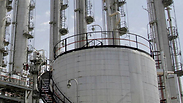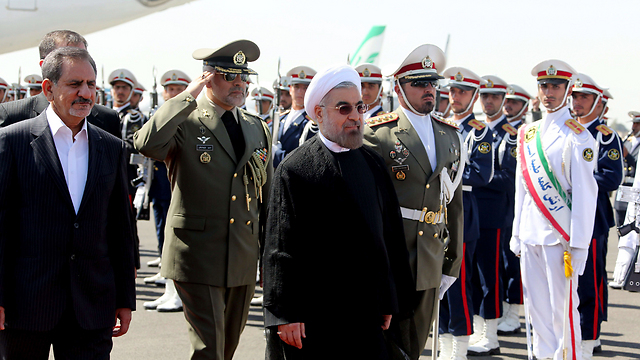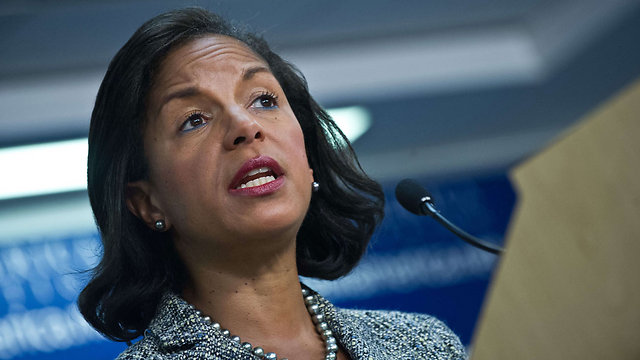
UN-Iran meeting inconclusive before Tuesday negotiations
IAEA still working for progress on transparency after apparently stagnant meeting; Susan Rice assures Israel that US will be tough on Iran in new talks to begin Tuesday.
VIENNA - The UN nuclear watchdog and Iran ended a three-hour meeting on Monday without announcing any new action to allay concerns about Tehran's atomic activities, leaving it unclear whether headway was achieved.
The International Atomic Energy Agency (IAEA) indicated after the talks that some more work was still needed for the full implementation of a series of nuclear transparency steps that Iran had agreed to take by May 15. It did not give details.
Reuters last week cited diplomatic sources as saying the IAEA is seeking further clarification from Iran about one of those measures - information about fast-acting detonators that have civilian and military uses, including setting off an atomic explosive device.
Related Stories
- Large explosion rocks northern Iranian city Ex-atomic agency chief: Netanyahu using scare tactics on Iran nuclear program
- Iran seeks new Russia nuclear reactor in exchange for oil
The meeting took place a day before the Iran and six world powers start a new round of negotiations in Vienna on a broad diplomatic settlement of the decade-old nuclear dispute.
Under a transparency and cooperation agreement reached with the IAEA in November, Iran was to take seven measures by May 15 in a phased process to shed more light on a nuclear programme the West fears may be aimed at developing atomic bomb capability.
The IAEA statement said the two sides had reviewed progress on implementation of the steps.

"The agency noted that Iran has taken several actions and that some related work continues," it said, without elaborating.
A recent UN report claimed that Iran's nuclear activities seem to be "slowing down". The experts expressed hope that this conclusion may reflect a real effort by Iranian President Hassan Rouhani to encourage a deal with the West, but admitted that the regime may have simply found better ways to hide its activies.
The lack of a clear outcome in Monday's meeting may disappoint Western diplomats, who want Iran to move much faster in addressing suspicions about past atomic bomb research. Tehran denies any such work.
Iran says it has already implemented the seven steps - including access to two uranium sites - but the sources suggested the IAEA still wanted more clarification about the so-called Explosive Bridge Wire detonators.
How Iran responds to questions about its development of this type of equipment is seen as an important test of its willingness to cooperate fully with a long-stalled IAEA investigation into suspected past activities relevant to the development of nuclear weapons.
Iran says allegations of such work are baseless and has offered to help clear up the suspicions.
Seeking Reassurance
Meanwhile President Barack Obama's top national security aid said on Monday that Iran must agree to "verifiable action" to satisfy US concerns about its nuclear program or else there will be no final deal.Addressing an Israeli Independence Day celebration in Washington, US national security adviser Susan Rice sought to reassure a pro-Israel audience that Washington would take a tough line with Tehran, despite Israeli worries that the Obama administration is giving up too much in the negotiations.
Israeli Prime Minister Benjamin Netanyahu, during a visit to Tokyo on Monday, said Iran's nuclear program was a "clear and present danger" and Tehran cannot be allowed to get the capability to make nuclear arms.
A November interim accord easing sanctions on Iran made clear that Washington and five other world powers would let it enrich uranium on a limited scale under a final agreement. But Israel wants the Iranians to be stripped of all disputed nuclear projects, a demand that put it at odds with its chief ally, the United States.

"We all have a responsibility to give diplomacy a chance to succeed. But America won't be satisfied by mere words. We will only be satisfied by verifiable action from Iran," Rice said to light applause from an audience that included Israeli diplomats and American supporters of the Jewish state.
"Put simply, if we are not satisfied, there will be no deal," Rice, who visited Israel last week, said, promising continued consultations with Israeli officials.
Iran and the United States, France, Germany, Britain, China and Russia will meet in Vienna on Tuesday for a new round of negotiations aimed at reaching a broad diplomatic settlement of the decade-old nuclear dispute.
Iran, Israel's arch-foe in the region, denies it is seeking nuclear weapons capability. Israel is widely assumed to have the Middle East's only atomic arsenal.
Long-Stalled Investigation
The diplomatic sources also said the IAEA wants to agree with Iran on new measures to be taken after May 15, to tackle other sensitive issues linked to what the agency calls the possible military dimensions of Iran's nuclear programme."Discussions on additional practical measures to be implemented in the next steps are ongoing," the IAEA said in the statement, suggesting no agreement had yet been reached.
Western diplomats say Iran must start engaging with the IAEA's investigation and that this is central to the success of the separate talks between the six powers and Tehran aimed at an accord by late July.
But diplomats say Iran and the powers - the United States, France, Germany, Russia, China and Britain - remain far apart on what a long-term deal to resolve the dispute, and dispel fears of a new Middle East war, would look like.










